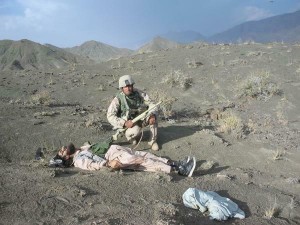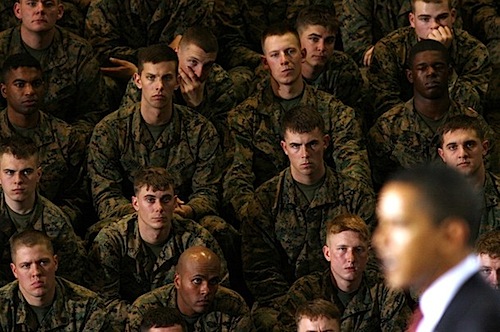At long last the paper trail authorizing the use of coercive interrogation techniques, to include tortures such as water boarding ( a simulated drowning technique) has been made public. The bottom line is that it reveals that high level Bush administration officials, to include John Ashcroft (Attorney General at the time), John Yoo (Deputy Attorney General), Alberto Gonzalez (White House counsel, later Attorney General) Dick Cheney (Darth Vadar) and Condoleeza Rice (Nurse Ratched), should be indicted for criminal offenses under both US and international law. What is worse, their authorization of criminal acts–no matter how Mr. Yoo’s convoluted legal arguments may wish to paint them as something less than torture and permissible under doctrines of Executive authority anyway–flew in the face of expert opinion that torture is an unreliable method for extracting reliable intelligence and could, in fact, be counter-productive both legally and practically. There are several layers to the story, so I shall briefly run through them.
The techniques used were derived from the SERE school practices. SERE is a program run by the US military to simulate the conditions of a prisoner of war camp in which US aviators and special forces operators might find themselves. It is modeled on 1950s Chinese prison camps. Under controlled conditions, SERE operators subject US personnel to what they admit are “torture techniques” (such as water boarding) in order to teach the US personnel how to resist coercive interrogations. Thus, the Bush White House and Justice department took techniques that were capable of being overcome by determined prisoner resistance and authorized their use, without fully exploring their history or the controlled circumstances of their SERE application, on suspected jihadis whose idea of glory comes in the form of martyrdom. Not to put too fine a point on it, but that is just arse-backwards.
In fact, once SERE camp administrators heard of the (mis) application in 2002 they wrote memos to the Defence Department protesting against the use of SERE techniques. They explicitly warned about the unreliability of the confessions extracted and the risk of accidental death. These memos were ignored by the Rumsfeld cronies who ran the Pentagon at the time and were apparently never passed onto the White House and Justice Department (or if they were, they were ignored). What is important to note is that the people who pushed for the use of these techniques were Republican ideologues who had no actual experience with interrogations. Most interrogators are US military counter-intelligence personnel, who are fully aware of the legal and practical pitfalls of using torture to extract confessions. These include the unreliability of the information extracted, the uselessness of such information for strategic intelligence purposes, the problems of garnering actionable information from atomized cells in a decentralized guerrilla network like al-Qaeda–in other words, the complete disutility of using SERE-type techniques for anything other than immediate tactical purposes (if that). Since these forms of punishment were being meted out in “black sites” Â thousands of miles away from the battlefields of Iraq (Abu Ghraib was more of a test case rather than a systematic application of the Yoo doctrine) and Afghanistan (although the prison at Bahgram Air Force Base outside of Kabul is reported to contain a “black site’), or in Guatanamo, even the tactical intelligence obtained was mostly unactionable. Hence, professional interrogators such as Special Forces counter-intelligence officers did not conduct the interrogations, but instead were replaced by CIA operatives or private contractors. The can of worms that opens almost defies belief.
In a nutshell:  the Bush administration authorized unproven and unreliable torture techniques against the advice of those who were best informed about the use and results of those methods, then replaced seasoned interrogators with civilians and private contractors to do the dirty work. Presumably this was to gain some of distance on any potential legal repercussions down the road. When one looks at the results of the Abu Ghraib case, where two enlisted soldiers served short jail sentences, two field officers were reprimanded and demoted and one flag rank officer demoted and  forced to retire, it easy to see how Bush administration officials believed that they would never be held responsible for anything that happened in the “black sites.”
Bush administration defenders claim that the coercive interrogation program obtained results in the form of preventing terrorist attacks but are unable or unwilling to offer a single instance of such a success. They claim that revealing the torture memos jeopardizes current and future intelligence operations and demoralizes the CIA. The answer to these claims (other than to laugh when Dick Cheney makes them), is to say 1) provide a single shred of evidence that an attack was prevented by the use of waterboarding and other forms of torture; 2) prove that any information obtained that was useful could not have been obtained using other (non-torture) techniques. Let us be clear: getting the names of other cell members, or of liaison contacts, or of the early outlines of a terrorist plot is not “actionable” intelligence that could not have been obtained by other means (say, by good human intelligence in the field). Arresting some of the Guantanamo detainees was enough to disrupt the most grandiose of al-Qaeda plots, so once their role was ascertained and their backwards linkages traced, use of torture was just vengeance, not intelligence-gathering. If the claim is going to be made that the use of terror was efficient, i.e., that it actually prevented an imminent attack, then it needs to be supported with proof. After all, the “informants” are not going anywhere so need not fear retribution and whatever intelligence penetration of terrorist networks has occurred should not be vulnerable to exposure if the truth of the matter is revealed (otherwise it is simply shoddy workmanship on the part of US intelligence and its allies).
The best way to verify such claims is to grant immunity to interrogators and lower-level CIA and military officials who oversaw coercive interrogations in  order to find out not only whether the techniques were as necessary as the Bush defenders say there were, as well as their results. More importantly, the main purpose of the grants of immunity is to determine the chain of command responsible for authorizing the use of torture, and on what grounds. The last point is important because as it stands, the Bush administration will hide under the doctrine of “plausible deniability” where subordinates get blamed for the physical acts but no evidentiary link can be conclusively made to the orders of high level officials. That deception can be countered with a “due obedience” approach whereby legal immunity to lower-ranked officials is exchanged for their testimony on who gave the orders and how did they do so (as well as how they tried to conceal those orders).  That is the key to getting indictments of Bush administration officials. John Yoo and his chief lieutenants, in particular (the former now happily ensconced as a Law Professor at UC Berkeley, of all places, the latter now anxiously realizing that private legal practice does not afford them any cover in the face of a federal indictment), need to be held to account because they apparently took an untoward interest in specific techniques and were the keenest to authorize their use. Getting these toadies to turn under the threat of imprisonment could in turn be the key to finding out what exact roles were played by Cheney, Bush and Rice in opening the Pandora’s box embedded in the torture memos.
Of course, being a cautious and pragmatic person, Barack Obama may pull the plug on any prosecutions in the interest of political security (his own and of the Democratic Party). If so, it will be up to the International Criminal Court to seek the truth of the matter, so that even those who rule a seemingly unassailable superpower realise that they too are not above basic standards of human rights and international justice. I shall not hold my breath waiting for either to happen. What is certain is that, until something dramatically different is revealed to counter what is known so far, Â from a moral-ethical as well as an efficiency-practical standpoint, the US use of torture in the fight against terrorism has been a failure more than a success.



